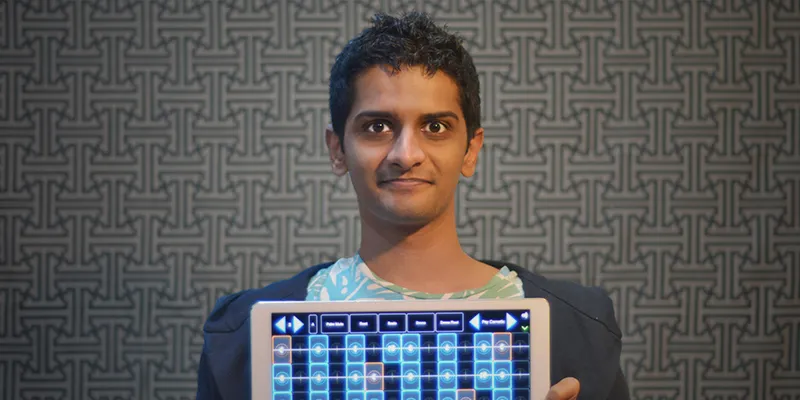Sound of music - How Adele’s song, Hello, got an Indian touch with Mahesh Raghvan’s tech genius
Ask any contemporary Indian music fan about fusion using classical sounds, and the first name that comes up is Mahesh Raghvan. The 26-year-old has been whipping up a frenzy on the internet by infusing Indian classical sounds into covers like Adele’s song, Hello, the Harry Potter theme and the Game of Thrones soundtrack. His musical weapon of choice? The iPad.
A consummate vocal artiste, Mahesh is also passionate about other related fields like visual arts, mobile application development, digital media, sound design, and film. He is the Creative Director of IndianRaga and also works with major music technology companies to make Indian classical music playable on their hardware/software.
In an interview with YSWeekender, Mahesh talks about his journey into music, how technology has introduced new sounds, and his collaboration plans.

Mahesh Raghvan is a wizard with his IPad
YSWeekender: Can you tell us a little about yourself and how you got into music?
Mahesh Raghvan: I was raised in Dubai and started my Carnatic vocal music training there at the age of four with my aunt, Indira Krishnan, who was my tutor.
When I was five, I could play the keyboard by ear. I trained in western music (keyboards and guitar) when I was in school. Later, my interest in music led me to pursue a Bachelor’s course in audio production and a master’s in music technology (from the University of Edinburgh, Scotland). Today, I am a full time performing musician, and my focus is presenting Carnatic Music in innovative ways to young audiences.
YSW: How was it growing up in Dubai?
MR: Dubai has a very large Indian community, and there was a lot of emphasis given to promoting fine arts around the time I was growing up. I was fortunate to attend a lot of Indian classical concerts and had access to really good teachers at a young age. Since the pressure on academics wasn't much (as compared to India), I had a lot more time for music while growing up. My parents have been extremely supportive throughout the journey.

Mahesh Raghvan loves tech fusion music
YSW: How did the tech infusion in your music happen?
MR: I was always fascinated by technology, but my interest in music technology and fusion music started when I was in college. I was exposed to a lot of electronic music and technology, and decided to experiment. Eventually I decided to publish my experiments on a YouTube channel around four years ago, and that’s how it all started.
YSW: Do you feel the introduction of tech sounds into traditional music is reviving Carnatic and Hindustani music, making it more attractive to young people?
MR: Indian classical music has always been evolving and new instruments are always being introduced to it. The introduction of technology has definitely made things a little more interesting. Fusion music is definitely more relatable to a young audience and serves as a great introduction to the pure classical form.
YSW: Is technology enabling music to become richer and more accessible to one who has not learnt the subtle nuances of classical music?
MR: Not really; the training gives you a better understanding of the music. Technology just helps present it in new ways, but I feel in order to fully appreciate the music, some level of knowledge is absolutely necessary.
YSW: What would you say to purists or critics of this form of music who believe it takes away the essence of tradition?
MR: Tradition is here to stay, and I think tradition lies in the music itself and not in the way it is presented. The presentation of classical music has always been evolving; for example, the violin (which is a considered part of the standard Carnatic ensemble today) is not even an Indian instrument to begin with. There are so many artists who are taking the pure form of Indian classical music forward, and they're doing a wonderful job.
My vision is to prove that Indian classical music is cool to people who aren't really interested in it. I present it in a way that is more relatable to young audiences; that serves as a good starting point for them to get into a pure classical rendition.
YSW: How do you come up with covers like - say a Carnatic tune for Harry Potter or Game of Thrones theme?
MR: My workflow for these kind of pieces always starts with breaking down the melody into different sections. Once I have different sections in place, I start rewriting them in Indian classical form with raga-based improvisations. Once the melody is in place, I work on arranging the rest of the piece using traditional Indian classical instruments.
YSW: You also collaborate a lot of other musicians…
MR: Collaborating with my peers helps me learn a lot within a short span of time. Every musician has ideas, skills, and experiences that are totally different to mine. Through the process of interacting with others, I get to watch and learn how the same ideas can be presented differently by different people. For me, collaboration is a way of learning new things, and making new friends.
YSW: Personally, what kind of music do like to listen to and who are your favourite singers?
MR: Most of the music I listen to is pure classical. I've always been a huge fan of Dr Balamuralikrishna.







